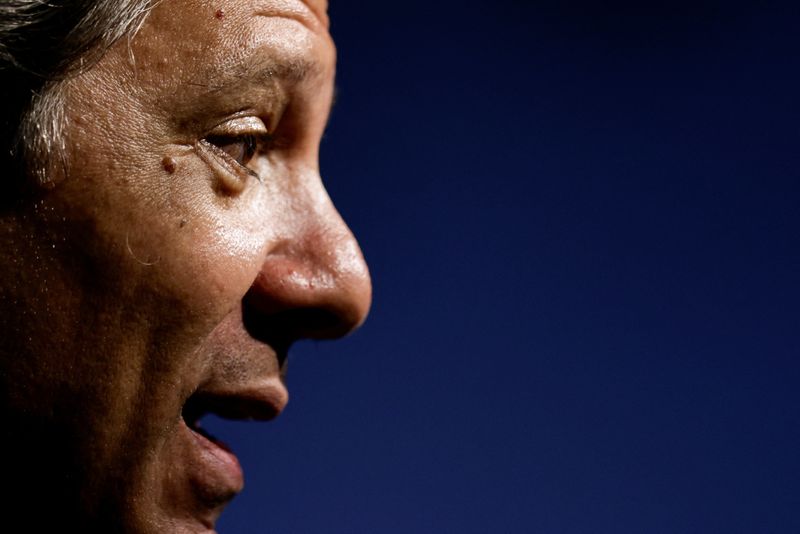(Reuters) – Finance Minister Fernando Haddad said on Monday that the government will announce a new round of measures that could generate an annual increase of more than 100 billion riyals in the federal treasury, citing restrictions on tax benefits granted to companies in the country. In addition to taxes on online sports betting and e-commerce sales it has classified as contraband.
In the larger impact measure, at R$85-90 billion annually, the government goes to the Federal Supreme Court to try to restrict corporations’ use of tax benefits granted by states in a strategy to level the income account base. Tax and social contribution on net income (CSLL). The goal is to ensure that this incentive only benefits the investments companies make, not including current expenses.
“When this concept is related to cost, what is the meaning of a company that makes more profits due to the tax benefit of the state deducting two federal taxes from its computational base, it does not make sense. We will limit it to the concept of investment,” he said in an interview with GloboNews.
The second measure, which Haddad mentioned earlier, will regulate sports betting sites that are authorized to operate in the country, but are not subject to tax. According to him, the estimated annual impact of the initiative rose from 6 billion riyals to between 12 and 15 billion riyals.
On the third front, the government must attack the online purchase of imported products that end up in the country without due taxes. The move comes amid complaints from local retailers about what they call unfair competition from the likes of AliExpress, Shein and Shopee.
In this field, the minister expects the government to lose between 7 and 8 billion riyals annually with what he called smuggling.
“The company that has e-commerce, disguises that e-commerce and passes it as a shipment from one person to another to avoid paying taxes … Brazilian and foreign companies that suffer from unfair competition from a global player or players and ask for measures from the revenue,” he said, without naming the companies.
The minister did not set a deadline for submitting the proposals. According to him, the portfolio still has three more measures to launch, but the tax reform progress must be waited until it is better calibrated.
Two sources familiar with the matter told Reuters that the ministry wants to end the blockade on export companies that use offshore companies to reduce tax payments.
At another point, according to the sources, the government is considering starting to levy income tax periodically, through the so-called eating rations, from exclusive investment funds, which pay the tax today only at the time of recovery.
Haddad said in the interview that the tax reform would seek to “impose taxes on those who do not pay” that would increase revenues and contribute to achieving the fiscal goals envisaged in the new framework introduced recently by the government.
For the country to fully adapt to the proposed financial framework, the minister said, it would be necessary to increase revenues between 110 billion and 150 billion riyals.
“Whatever the framework standards for the next year (with an increase in revenues) are between 110 billion and 150 billion riyals, this is a zero deficit,” the minister said.
According to Haddad, the tax reform should also contribute to increasing revenues, because the value-added tax (VAT) proposed by the government will be “more evidence of evasion” than taxes as they are currently organized.
The minister also said that because of this, the tax reform could allow a reduction in consumption taxes – which, according to him, are “very high” in Brazil – in the long term.
central bank
Haddad said in the interview that he was unaware of President Luiz Inacio Lula da Silva’s decision to appoint him to the BC board.
“I sent five names to President Lula, and I did not meet with him afterward to see if he made up his mind about it… I did not have, from the president, a signal like ‘invite Seclano and Beltrano,’” Haddad said.
Three sources familiar with the matter told Reuters last month that Lula had agreed to nominate Rodolfo Froes for the post of director of monetary policy at the central bank and Rodrigo Montero for the autonomy’s inspection zone. Overall, the names were received positively by financial markets and BC officials.
According to Haddad, Lula commented to some of those close to him that he liked some of the names that Haddad referred to, but the president did not tell the head of the treasury which of the five proposed names he preferred.
The minister also took advantage of the interview to criticize the monetary policy behavior by the central bank once again, arguing that it is not logical to keep the base interest rate close to the level of 14%. The benchmark interest rate has not changed at 13.75% per annum since September 2022.
Haddad said again that he sees scope for lower interest rates in Brazil, in part by increasing fiscal credibility with the introduction of the new framework.
Haddad on Monday held his first official meeting with Central Bank President Roberto Campos Neto since the government submitted a new fiscal framework proposal.
(Luana Maria Benedetto, Bernardo Karame and Marcela Ayres)

“Hardcore beer fanatic. Falls down a lot. Professional coffee fan. Music ninja.”






More Stories
Sabesp Receives Brazil Innovation Value Award 2024 • PortalR3
Total formal job creation reached 201.7 thousand in June, up 29.6% | Economy
10,000 Brazilian Reals are waiting for you at Nubank? Find out who can get this money!